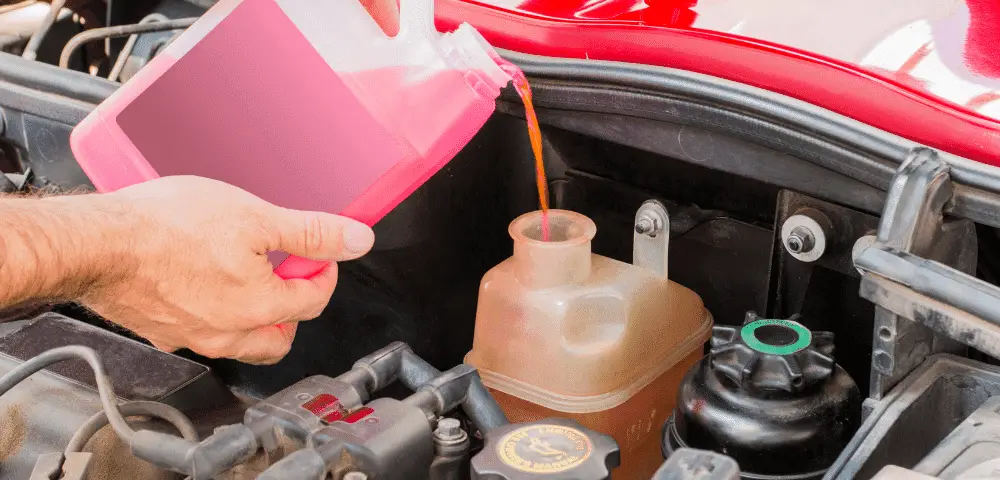The more invested you are in your vehicle, the less likely it will develop issues without you unaware.
One of the most important things you need to consistently check in your vehicle is your coolant level.
You shouldn’t have to wait until your radiator leaks or your car overheats before you do.
The aim of this article is to describe what a car’s cooling system is, give reasons why you should always check it, and answer some questions you may have, including how much coolant a radiator holds.
What is a Car’s Cooling System?
The cooling system in a car helps reduce heat from the engine and make sure it moves at an optimum temperature for maximum efficiency.
The cooling system often comes with different components such as the cooling fan, overflow hose, and radiator.
Why Does a Car Engine Needs Coolant?
A car’s engine coolant is important to remove heat from the engine.
This heat is formed when the internal combustion engine powering the car burns fuel in the cylinders at extreme temperatures to create the force for movement.
The working mechanism of the engine coolant goes thus:
From the circulation of the coolant (or anti-freeze), heat is absorbed optimally from the engine and it gets immediately cooled, passing through the radiator.
As long as the car’s engine keeps running, it is a continuous process.
If the engine coolant isn’t working continuously or it is damaged, in little or no time, your car would overheat and the engine could get damaged.
What are the Functions of an Engine Coolant?
- The first function of an engine coolant is to raise the cooling system’s boiling point because it is important to the engine’s efficiency.
- The second function of an engine coolant is to lower the freezing point of the cooling system’s liquid. Depending on the type of fluid (or liquid), your engine may be put at risk. For instance, if it is plain water, the freezing point gets to o degree celsius, which is a lot risky to the engine.
- The third function of the engine coolant is to inhibit corrosions that may affect or damage the engine, radiator, and other components of the cooling system.
Can you put too much coolant in the radiator?
Now that you know why a coolant is important, it is also consequential that you are aware of how the volume has an effect on your engine.
If you fill too much coolant in the radiator reservoir plastic coolant recovery tank, the radiator picks up what it can use, and sends the remaining to the coolant reservoir when the car is hot.
If the reservoir, however, does not have room for more of the coolant (or anti-freeze), it spills to the floor.
How many gallons of coolant does a car need?
Ideally, an engine’s cooling system needs a decent volume of radiator coolant to remove heat and improve efficiency.
How much antifreeze to fill a radiator?
About 3 gallons of antifreeze coolant is admissible.
The coolant capacity is always the same for different vehicles but there could be differences in the constituents because different systems may need varying solutions with water.
However, one thing is certain: the radiator fluid must contain rust and mineral inhibitors.
Is It OK to Add New Coolant Without Draining the Old?
You don’t necessarily need a radiator coolant flush if you want to add coolant to your radiator.
A radiator flush means draining the old one for the new one to come in.
However, a radiator flush (or coolant drain) becomes important when the older coolant has become acidic.
An acidic or concentrated coolant could cause corrosion and could affect your vehicle’s cooling system adversely.
That being said, you need a replacement coolant at least after every 30,000 miles journey. If you go beyond this limit, do an antifreeze flush before adding a fresh coolant.
What Happens if You Overfill Your Coolant Reservoir?
If you go beyond how much coolant your car engine needs, i.e., overfill and have an overflow tank, the excess coolant is expelled from the hose (expansion tank piping) to the ground.
You will likely see a puddle of coolant beneath your car.
In some situations, the excess coolant from the antifreeze tank may come in contact with the engine wiring and ultimately causes electrical damage.
How Long Does Coolant Last in a Car?
There are different factors responsible for how long a coolant lasts in a car.
First, the vehicle in question is one factor. The radiator capacities vary from one car to another.
Another factor is the coolant mixture – the proper coolant mixture contains hybrid organic acid technology, while conventional coolants contain inorganic additive technology.
There are other specialized coolants such as ethylene glycol, distilled water, and pre-mixed solution.
Nonetheless, the average time a coolant can last in most cars is between 2 to 5 years (i.e., 30,000 miles to 100,000 miles).
Top Signs of Low Coolant?
Cooling and antifreeze protection is important for your car’s engine. However, if you are not properly invested in how much engine coolant your car has, there are some signs you may experience.
Below are the top signs you’ll experience if you drive with low coolant.
Rising Temperature
One of the first signs of a dropped coolant level in a car is rising temperatures – you would have your engine overheating extensively. With this rise in temperature, your engine starts to malfunction, i.e., engine block.
You would get to a point where you won’t be able to drive for long.
Non-Functioning Heater
If the minimum fill line marked is exceeded, certain features in your car stop working because of a low coolant level.
Features like the heater, the dashboard warning light, and other electrical parts stop working.
Low Fuel Economy
Low coolant will reduce fuel consumption because the engine is affected from overheating. And with low fuel economy, the likely chances of moving far distances with your car are low.
Pleasurable Smell
One more sign that comes with low coolant or coolant leak is a sweet smell.
Can You Drive with Low Coolant?
Ideally, when you drive, the radiator transports coolant to lower the engine’s temperature. However, if your car’s radiator doesn’t get enough to transport, the engine starts increasing in temperature due to the heat from driving.
With no sufficient coolant level, your engine could be damaged. Ultimately, you may not be able to drive your car.
How Much Does It Cost to Replace Coolant in a Car?
Engine coolants vary from one brand to another – as well as one component to another. This radiator fluid for cooling systems also depends on vehicle type and size.
Most radiator capacities are large, taking up to 3 gallons of antifreeze coolant.
That being said, it costs between $100 to $200 to get a standard chemical coolant for your car.
Coolant Vs Water
If you’ve ever been in a situation where you’ve questioned whether to pour pure water in your engine or not, here is your answer:
Pure water is not a proper coolant – in fact, it is corrosive to the engine. In no time, your coolant system would become damaged.
On the other hand, coolants contain anticorrosive components that would improve your engine’s life.
However, one important thing you should bear in mind when you want to increase the coolant level of your car is: never pour the new coolant into a hot car.
The hot coolant would bubble out and cause engine damage.
Conclusion
From this article, you have answers to questions like: “How much coolant can a car hold?” “Can I have an overflow tank?” “How can I add coolant to my car?” and “Can I use distilled water as an alternative for coolant to my vehicle’s cooling system?”
Coolants are important to your engine’s health; thus, you should make sure to do everything possible to be invested in it.
Get the best coolant with the right components and protect your car’s cooling system extensively.


